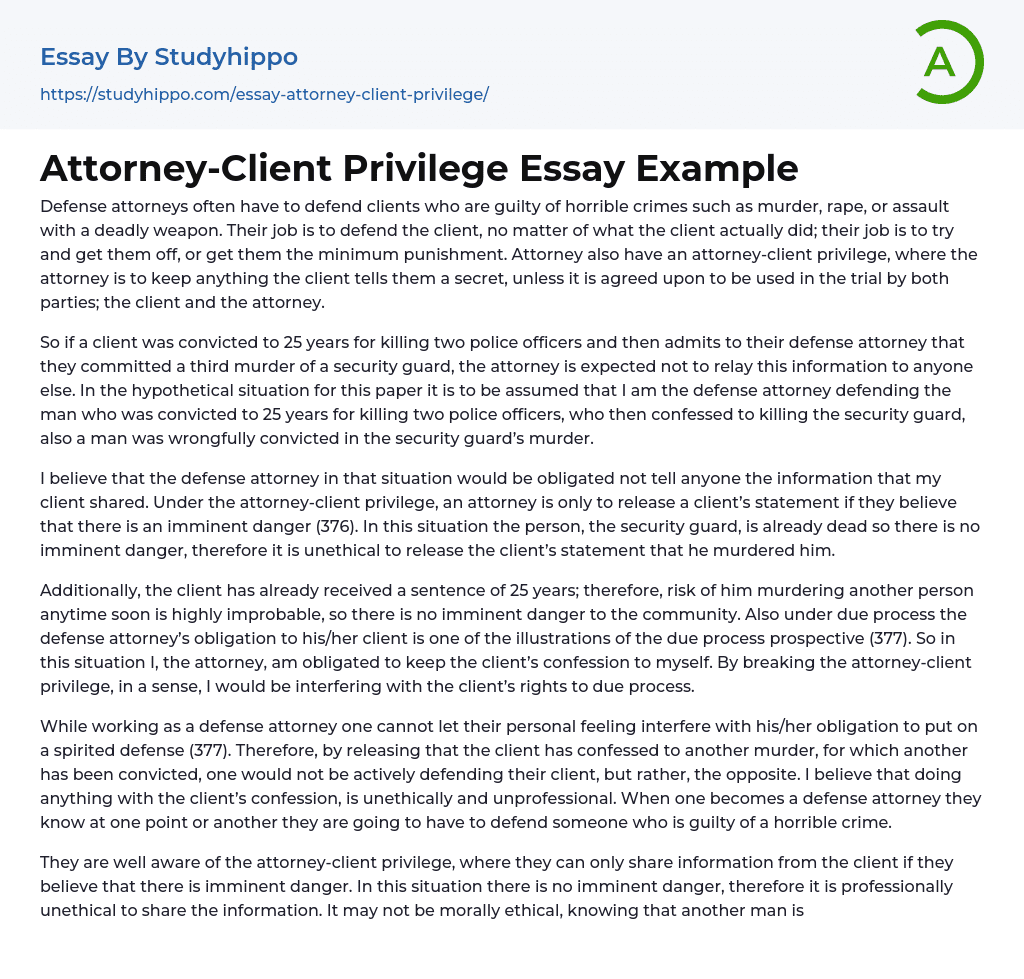
Defense attorneys often have to defend clients who are guilty of horrible crimes such as murder, rape, or assault with a deadly weapon. Their job is to defend the client, no matter of what the client actually did; their job is to try and get them off, or get them the minimum punishment. Attorney also have an attorney-client privilege, where the attorney is to keep anything the client tells them a secret, unless it is agreed upon to be used in the trial by both parties; the client and the attorney.
So if a client was convicted to 25 years for killing two police officers and then admits to their defense attorney that they committed a third murder of a security guard, the attorney is expected not to relay this information to anyone else. In the hypothetical situation for this pa
...per it is to be assumed that I am the defense attorney defending the man who was convicted to 25 years for killing two police officers, who then confessed to killing the security guard, also a man was wrongfully convicted in the security guard’s murder.
I believe that the defense attorney in that situation would be obligated not tell anyone the information that my client shared. Under the attorney-client privilege, an attorney is only to release a client’s statement if they believe that there is an imminent danger (376). In this situation the person, the security guard, is already dead so there is no imminent danger, therefore it is unethical to release the client’s statement that he murdered him.
Additionally, the client has already received a sentence of 25 years
therefore, risk of him murdering another person anytime soon is highly improbable, so there is no imminent danger to the community. Also under due process the defense attorney’s obligation to his/her client is one of the illustrations of the due process prospective (377). So in this situation I, the attorney, am obligated to keep the client’s confession to myself. By breaking the attorney-client privilege, in a sense, I would be interfering with the client’s rights to due process.
While working as a defense attorney one cannot let their personal feeling interfere with his/her obligation to put on a spirited defense (377). Therefore, by releasing that the client has confessed to another murder, for which another has been convicted, one would not be actively defending their client, but rather, the opposite. I believe that doing anything with the client’s confession, is unethically and unprofessional. When one becomes a defense attorney they know at one point or another they are going to have to defend someone who is guilty of a horrible crime.
They are well aware of the attorney-client privilege, where they can only share information from the client if they believe that there is imminent danger. In this situation there is no imminent danger, therefore it is professionally unethical to share the information. It may not be morally ethical, knowing that another man is innocent, yet serving the sentence, but as a defense attorney one is expected to leave all of their emotions out of the courtroom, and they are expected to do whatever they can to defend their client. So in this situation I would keep the information to myself and honor
the attorney-client privilege.
- Values of Life essays
- Ethical dilemma essays
- Normative Ethics essays
- Virtue Ethics essays
- Belief essays
- Deontology essays
- Moral essays
- Virtue essays
- Work Ethic essays
- Kill essays
- Internet Privacy essays
- Cyber Security essays
- Acceptance essays
- Age Of Enlightenment essays
- Child Observation essays
- Confucianism essays
- Conscience essays
- Critical Reflection essays
- Destiny essays
- Determinism essays
- Empiricism essays
- Environmentalism essays
- Epistemology essays
- Ethics essays
- Ethos essays
- Existence essays
- Existentialism essays
- Fate essays
- Free Will essays
- Functionalism essays
- Future essays
- Good And Evil essays
- Human Nature essays
- Individualism essays
- Meaning Of Life essays
- Metaphysics essays
- Natural Law essays
- Personal Philosophy essays
- Philosophers essays
- Philosophy Of Life essays
- Political Philosophy essays
- Pragmatism essays
- Reality essays
- Relativism essays
- Teaching Philosophy essays
- Time essays
- Transcendentalism essays
- Truth essays
- Utilitarianism essays
- Agreement essays



